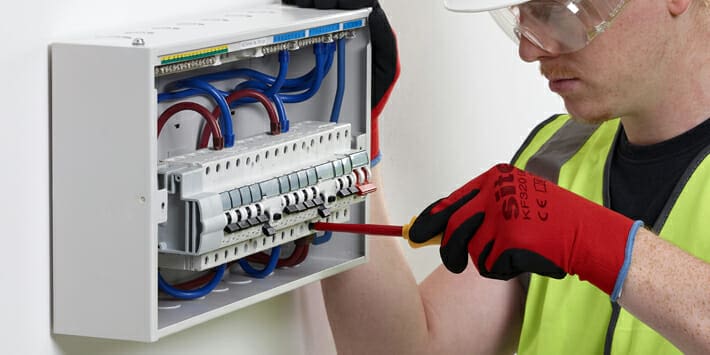As of the 28th September 2022, there will be a new regulation implemented introducing Arc Fault Detection Devices (AFDDs) – this is the new compulsory 18th Edition amendment 2 of BS7671 (Electrical Regs)
How does this affect you?
From the 28th September 2022, any EICR that is instructed on HMO’s will identify the absence of AFDDs from consumer boards as a C3 observation and may require remedial work to be carried out to achieve a ‘Satisfactory’ rating.
AFDDs are installed in consumer units to provide protection from Arc faults. They use a microprocessor technology to analyse the wave form of electricity being used to detect any unusual signatures that would signify an arc on the circuit. If detected, the power will cut off to the affected circuit with the intention of preventing a fire.
The PTS Compliance team are full of qualified engineers. As a proud members of the NICEIC and ECA, we are committed to performing electrical checks for landlords, giving you and your tenants peace of mind about the property’s safety. In addition to the normal accreditations PTS Compliance have also been assessed and certified to complete domestic EICR’s in the private rented sector.
Here comes the techy bit…
Regulation 421.1.7 now requires that AFDDs conforming to BS EN 62606 shall be provided for single phase AC final circuits supplying socket-outlets with rated current not exceeding 32A in HMO properties.
Arcs are visible plasma discharges caused by electrical current passing through a normally nonconductive medium, such as air. Caused when the electrical current ionizes gases in the air, and temperatures created by arcing can exceed 6000 °C. These temperatures are sufficient to start a fire.
The most common causes of arcs include worn contacts in electrical equipment, damage to insulation, break in a cable and loose connections, to mention a few.
What is the cost implication?
The cost for the device is estimated around £250.00 – £450.00 (ranging in make and model – installed) but this will likely decrease over time with the implementation of the requirement. One device is needed per socket circuit and any associated cost for the electrician to install and retest.
It may be possible that the AFDD can be inserted directly in place of the circuit breaker inconsumer units. However, it will more than likely need a consumer unit reconfiguration which may not be applicable to all units, in a worst case, a new unit being required. Overall, the estimated total ranging between £200.00 – £2,000.00+ depending if a new consumer unit is required.
How often do Landlords need to renew their EICR?
The regulations state that an electrical safety certificate will be valid for 5 years unless the inspectors deems it necessary to reduce that time frame. This means that you should only require an EICR to be completed every 5 years. There are alot of companies stating that the report is valid for ‘5 years or change of tenancy.’ This is incorrect as the regulation requires the testing to be performed at regular intervals rather than when a tenant is changed.
PTS Compliance are specialists in safety services and electrical checks for landlords – testing to BS7671 standards. If you’re a landlord looking to have your let tested, get in touch so we can help to protect you in legal proceedings, providing comfort to yourself and your tenants.
GET IN TOUCH
We endeavour to reply to you within 2 hours during normal working hours.
